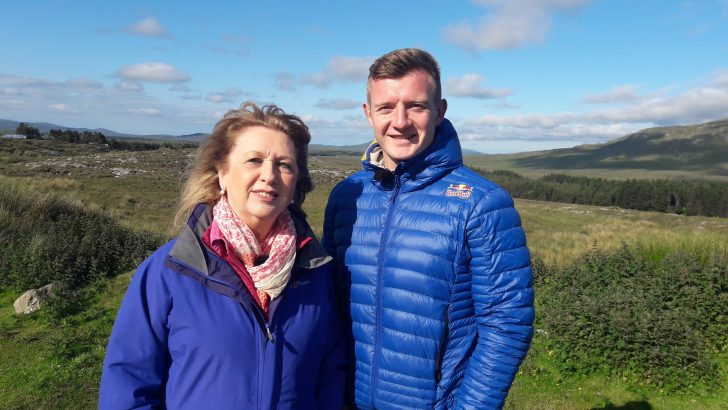Galway’s Joe Canning offers an insightful glimpse of a lived Faith, writes John G. Dwyer
Sports stars have a reputation for giving dull interviews. Generally, they are wary of providing hostages to fortune while seldom venturing meaningful insights beyond their own discipline. GAA players may be forgiven for this as they must live a life that is frenetically shoehorned between work, family and an all-consuming commitment to team endeavour, which allows little time for insightful reflection.
There are, however, exceptions: Philly McMahon of Dublin, Eamon McGee of Donegal, Donal Óg Cusack of Cork and to an extent Joe Canning of Galway. Always individualistic in his play, Canning invariably shows up in that part of the field where the action is – irrespective of the position allocated to him by his team manager. He has also stirred controversies off the field, most noticeably by suggesting that Kilkenny hurlers were “a bit cuter” at manipulating the referee; and that they “influenced” frees.
In many ways he is the perfect subject for a pilgrim path walk as his own sporting pilgrimage has been a long one. Bursting on the inter-county scene in 2008 like a shooting star, he had to wait until 2017 to taste all-Ireland success and become ‘Hurler of the Year’. Along the way there were many dark days created by a succession of injuries and his own admission of a nagging fear he would never claim the Liam McCarthy Cup.
Unique light
The first star to emerge from the new RTÉ series All Walks of Life, which featured Canning, is the outrageously beautiful Connemara countryside.
The programme was filmed when the unique light in the West of Ireland was at its most evocative and the delicately artful camera work captures this sublimely along with the stark beauty of the lonesome Connemara landscape. The initial show made a fine advertisement for the soothing effect of pilgrim walking and is likely to draw much additional footfall to Ireland’s penitential trails.
Ascending the Maumean Pilgrim Path with former president Mary McAleese, there are flashes of insight to Canning the man. Coming from what was clearly a religious background, he recalls the evening Rosary being said by the family which must have been quite uncommon even for 1990s Ireland.
Unusually perhaps for a young sportsman, he remains a regular Massgoer who believes in an afterlife, the spiritual side to his own nature and the occasional need for prayer.
He recalls the evening Rosary being said by the family which must have been quite uncommon even for 1990s Ireland”
He also takes comfort from the fact that he expects to meet loved ones again in an afterlife.
One of his most insightful contributions is his belief in the value of “not being afraid to fail”; he now tells young people not to fear failure, but to learn from it. He has had much experience here and rightly puts to bed the oft quoted modern sporting mantra that does so much damage to young sports stars, namely, “failure is not an option”. Failure is, of course, not only an option in life it is also an unavoidable part of human existence.
There is also discussion of Canning’s role as an ambassador for UNICEF. He comes across as feeling deeply for the suffering of those facing poverty and oppression but is not probed about what he has learned his many journeys about the underlying causes of inequality.
This is not the only time when one longs for more probing questions from McAleese. Canning seems unusually insightful for a star sportsman, yet he is not always queried deeply. Undoubtedly a huge weight of expectation was placed on his young shoulders by the media and an expectant Galway hurling public that, at times, he has struggled to live up to. There is, after all, a litany of sports stars from George Best to Bjorn Borg and Kenny Egan who have buckled under the weight of early fame.
The Galway man did survive, but what were his coping strategies during the barren 11 years when he was forced to watch from the side-line as many lesser players cruised to regular all-Ireland glory? While professional sport stars tend to live in an insulated, wealth comforted bubble, GAA players must make a living in the community. How did Canning feel about immediately facing Galway’s unforgiving supporters after one of his many painful defeats?
One of his most insightful contributions is his belief in the value of ‘not being afraid to fail’”
As a businessman he must totally commit to serving his customers while at the same time juggling the competing demands of playing for club and county. Does he see this as a challenge or a source of stress?
Some opportunities for a more insightful conversation were undoubtedly lost from All Walks of Life. Nevertheless, the programme made compelling viewing. McAlesse will, perhaps, be more securely within her comfort zone when walking, next week, with Cindy Joyce, who grew up on a halting site but went on to become the first member of the travelling community to gain a PhD. A show not to be missed.
John G. O’Dwyer is an experienced mountaineer and hill walker. His recent book Wild Stories from the Irish Uplands is available from Currach Books. See also Deep thoughts silence the class of the ash


 Joe Canning and Mary Mcaleese
Photo: RTE
Joe Canning and Mary Mcaleese
Photo: RTE 